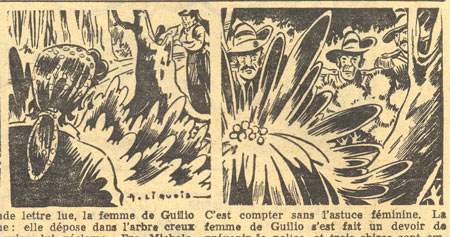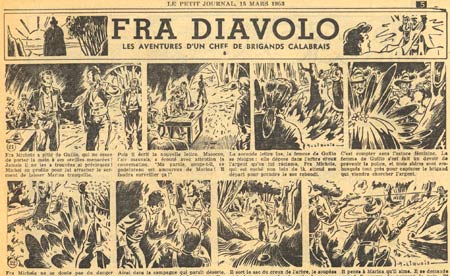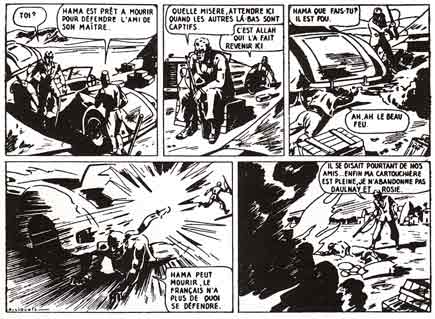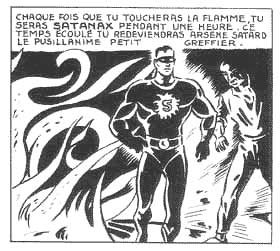'Fra Diavolo' (Quebec newspaper Le Petit Journal, 15 March 1953).
Auguste Liquois was born as the eldest son in the Liquois family in Angers. When his father was called to battle in World War I, he had to take care of his family. Somehow he managed to study Fine Arts on the side. In 1926 he moved to Paris, where he started his illustration career. He did fashion sketches, posters and humorous illustrations for magazines like Le Rire, Ric et Rac, and Gai Paris. In 1937 he drew his first comic, 'Coco de la Lune', from a scenario by Ferraz, in Boum!. From then on, Liquois collaborated with several comic magazines, such as Pierrot (several stories), Lisette ('La Cage Dorée', 'La Larme d'Allah') and L'Épatant ('G. Man 25').
'Ramy aux-Champs' (Pierrot, 1940).
During World War II, when the American comics couldn't reach the European mainland, Liquois finished one of Burne Hogarth's 'Tarzan' stories in Pierrot, and also drew 'Le Signe du Jaguar'. During the War he was present with several comics in Cahiers d'Ulysse and Le Téméraire ('Vers les Mondes Inconnus', 'Oulaa le Chevelu'), the latter being under Nazi supervision. For the satirical magazine Le Mérinos, he drew 'Zoubinette' under the pseudonym Robert Ducte, a comic that ridiculed the Resistance.
'Fra Diavolo' (Quebec newspaper Le Petit Journal, 15 March 1953).
In spite of his activities during the War, Liquois was present in the first issues of the socialist magazine Vaillant with the patriotic series 'Fifi Gars du Maquis' (text by Roger Lécureux). From then on, he multiplied his activities for the Collection Globe-Trotter, Collection À Travers le Monde, Cadet Journal ('L'Empire des Hommes Rouges'), the Collection Vaillance ('Jerry l'Infaillible') and Robinson l'Écureuil ('Héros de la Liberté').
Comic strip by Auguste Liquois.
In Coq Hardi, Liquois drew the first episode of the science fiction comic 'Guerre de la Terre', from a script by Marijac, later continued by Pierre Duteurtre (Dut). He also took on superhero series like 'Satanax' (in Satanax), 'Atomas' and 'Salvator' (in Tarzan). From the late 1940s and throughout the 1950s, he worked for Collection Sans Peur, Collection Hurrah ('Tom Mix'), and Les Classiques en Images (comic adaptations of playwrights Pierre Corneille and Molière) and for the magazines Pierrot ('L'Appel du Bouddha'), Ardan ('Kromagoul'), Fugor ('Marc du Réseau Marianne'), Ima ('Canard et la Vallée Perdue', 'Ric Limar'), Le Trident ('Le Fils du Far West').
In addition to his work for magazines, Liquois was active for the press since 1949. He has worked on several daily text strips for L'Humanité, such as 'Fra Diavolo', 'Quentin Durward', 'La Duchesse de Langeais', 'Les Trois Amours de Jean Cavalier'. He also made vertical strips for Femmes d'Aujourd'hui. His final creations appeared in Sonic ('L'Enfant de l'Oregon'), Les Loups ('Les Fils du Sergent') and Yphon ('Capitaine Fracasse') throughout the 1960s.
'Satanax'.






